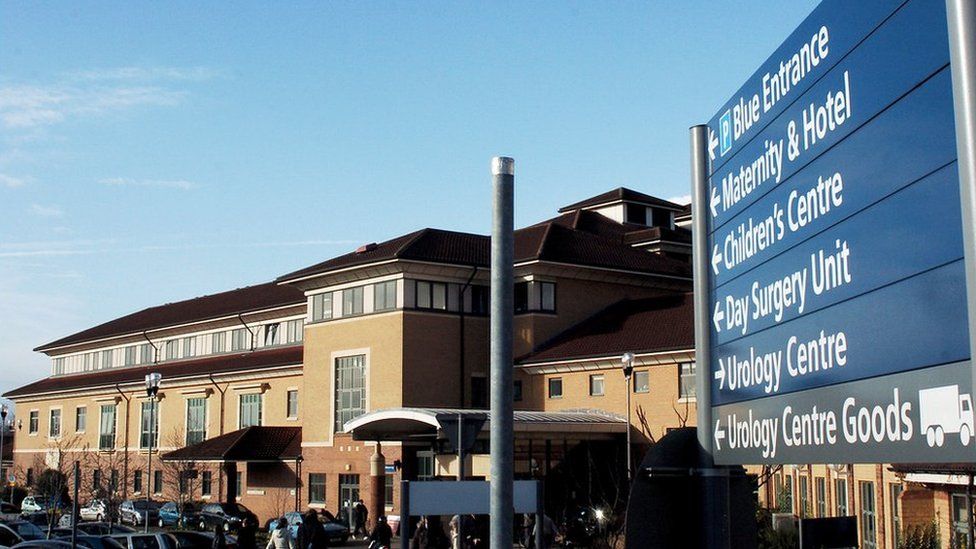ARTICLE AD BOX
 Image source, PA Media
Image source, PA Media
Thousands of medical letters were hidden within the hospital's computer system and not sent out
By Sharon Barbour
BBC News
An NHS hospital trust in Nottingham failed to send more than 400,000 digital letters and documents to GPs and patients, BBC News can reveal.
A former employee has told of "a lack of responsibility" over a new computer system.
Patient body Healthwatch said it was "deeply concerned" by the scale of the incident and the impact on care.
The trust says a full investigation took place in 2017 and found no significant harm to patients.
But the healthcare regulator said it was not aware of the incident and would be following up with the trust.
This is the second major incident in England involving unsent NHS letters uncovered by the BBC this week.
The events in Nottingham are on a bigger scale to those reported in Newcastle involving 24,000 letters.
Serious incident
The issue in Nottingham dates as far back as 2000, but the majority of unsent letters started to pile up from 2008, with up to 45,000 documents a year unsent by 2014.
Again, the BBC has been told the problems occurred when letters requiring sign-off were placed into a folder few staff knew existed.
In Nottingham, a "Level 2 Serious Incident" took place in 2017, and involved letters and medical documents that were effectively hidden within the hospital's computer system and not sent out to GPs as they should have been.
A former employee at the City University Hospital in Nottingham, Emily Reason, confirmed the incident.
She said she came across some recently written but unsent digital GP letters awaiting authorisation in September 2017.
Ms Reason then carried out that authorisation, but by doing so she had unwittingly also authorised over 1,300 old letters and documents.
This came to light when one GP contacted the trust. They had just received six letters about their patients, dating from 2013.
The incident triggered an inquiry at the trust the same year.
That investigation revealed that 411,000 letters and crucial medical documents which senior doctors believed had been sent out to GPs and added to patient records, had not been given a final authorisation - so they were sitting on computer systems, and no-one was aware.
'Lack of responsibility'
Ms Reason told BBC News how staff struggled with using a new "paperless" system for typing letters, called Medical Office.
"Not authorising the letters was everybody's and nobody's fault," she said.
"Because there was a lack of training. There was a lack of responsibility or lack of expectations of responsibility."
When it was clear there was a problem, Ms Reason said it was minimised as much as possible and hidden.
"It was assumed almost immediately that the risk to patients would be low, but the reputational risk was high," she told the BBC.
"I thought it would be all right now because the hospital would just handle it."
Emily said she decided to speak out after seeing the recent BBC story about similar letter-sending errors at hospitals in Newcastle.
She believed those issues could have been avoided, had the problems at Nottingham been made public to warn other trusts.
Healthwatch, the body which collects patients' experiences of health and social care, said it was "deeply concerned" to learn about the Nottingham incident.
"Whilst we know that sharing patient information has always been a significant challenge for different parts of the system, we cannot understand how this has happened on such a huge scale," said Jane Laughton, CEO of the Nottingham and Nottinghamshire branch.
She said there was particular concern over the impact of missing treatment plans and prescriptions for those with the most complex care needs.
Dr Peter Holden, a member of the British Medical Association's GP committee, said: "You would think in this age of computers that the transmission of information between hospital and general practice would be easy - it isn't."
He said primary care staff spend hours every day - time which should be devoted to patient care - chasing up discharge letters from hospitals as well as outpatient appointments.
"It's this kind of nonsense in the 21st century that is slowing up the practice of medicine because doctors are no longer administratively supported in the way they should be," he said.
Improved training
Anthony May, chief executive at Nottingham University Hospitals, confirmed an issue was identified in 2017 relating to the Medical Office system, which included letters to GPs amongst other documents.
"As a result, a serious incident was declared and a full investigation was undertaken to establish actions in line with the Trust's governance processes at the time," he said.
Documents which posed a high risk were then reviewed and acted upon - about 23,000 files, according to the trust.
"GPs were informed, and we worked alongside representatives from primary care to agree which correspondence should be resent, which was completed." Mr May said
"No significant patient harm has been identified following the incident."
The Medical Office system is still in use at the Nottingham trust but bosses say they have improved training to stop the issue from happening again.
A spokesperson for NHS England said hospital communication systems were "managed locally" and it was "essential" that all local NHS organisations ensure their processes for sending correspondence to patients and GPs are operating as they should be.
A Department of Health and Social care spokesperson said officials would work with NHS England "to establish the facts and take any necessary action" so patients across the country receive the highest standard of care.

 1 year ago
88
1 year ago
88








 English (US) ·
English (US) ·